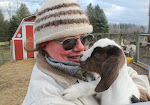 Hottie, one of our purebred Boer does, blew it again. She is a perfect example of what has happened in the meat goat industry, especially with registered Boers. Hottie was a product of a purebred doe that was brought up from the south for a registered production stock sale about five years ago. Buyers in the northeast were desperate for registered Boer goats. Unfortunately, they were also ignorant and paid top dollar for animals that should have been culled. But instead, slick salesmen drove their animals north and peddled them to many unsuspecting buyers for top dollar instead of to the auction or slaughter house.
Hottie, one of our purebred Boer does, blew it again. She is a perfect example of what has happened in the meat goat industry, especially with registered Boers. Hottie was a product of a purebred doe that was brought up from the south for a registered production stock sale about five years ago. Buyers in the northeast were desperate for registered Boer goats. Unfortunately, they were also ignorant and paid top dollar for animals that should have been culled. But instead, slick salesmen drove their animals north and peddled them to many unsuspecting buyers for top dollar instead of to the auction or slaughter house.While Hottie's bloodline is impeccable, sporting many of the well-known genetic lines of the Boer goat world, the truth is that she herself needs to be taken out of the gene pool for a variety of reasons.
First, she's a lousy mother...drops her kids and then walks away. Zero maternal instinct. Secondly, she has a very poor teat structure known as "fish teats". Each one of her teats ends has a functioning pair of nipples. Milking colostrum out of her has been difficult & messy. Despite her good body condition and minimal parasite load, this is the second time she's kidded with low birth weight babies when all the other does are delivering normal kids. If you follow this blog, you may recall the Neonatal post from about a year ago.
Yes, that was her doing. This time she had twins--bucks both less than two pounds. They should have been 8-10 pounds each. Again, she dropped them and walked away. When we found them, they were cold and one hadn't even been cleaned off. They were barely alive. Off to the neonatal ward to get dried off and warmed up.
 Both were still weak so after stripping colostrum from the doe, I tubed them. One perked up, but the other I put down this morning rather than let it suffer. It was obvious he was not long for this world.
Both were still weak so after stripping colostrum from the doe, I tubed them. One perked up, but the other I put down this morning rather than let it suffer. It was obvious he was not long for this world. Despite having the ability to be registered as breeding stock, the remaining buck is destined for the dinner table. Low birth weight combined with an undershot jaw has levied two strikes from the moment he hit the ground. He'll be raised up to 20-25 pounds and sold as a whole milk-fed kid or put into our own freezer. While I admit that I may sound callous, the reality is that if people in the meat goat industry continue to breed inferior animals, the reputation and growth of our industry will suffer. That's why in a few weeks, all the does who have blown two consecutive breeding seasons, will be heading to Horsts', my USDA butcher. By doing so, I feel that I'm being a responsible breeder by not allowing such poor genetics to continue to pollute the Boer goat gene pool.
So, look for goat sausage at the Carlisle Central Farmers Market by the end of April.





I don't see you as a callous persn at all. Instead, I see you as a responsible breeder. Having a farm and being with animals has changed my opinion of these matters greatly. I wish more breeders of all animals would stop looking at the bottom dollar and start looking at the quality. When we purchased our sheep, we went to several farms. I know very little about sheep, but I could tell which ones where responsible breeders by looking at their flock. We ended up spending a bit more per animal, but to me it was MORE than worth it.
ReplyDeletegrace and peace,
julie
As my wife & I are starting to look into farming, this issue comes up. We are thinking dairy goats, but you still have to cull, do something with the buck kids, etc. Was this side of things harder than you expected or easier? Do you get used to it?
ReplyDelete